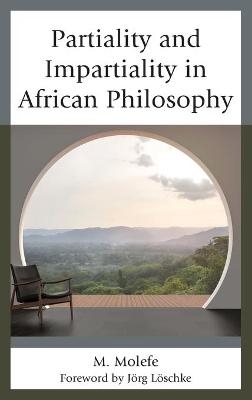
Partiality and Impartiality in African Philosophy
Seiten
2021
Lexington Books (Verlag)
978-1-4985-9943-6 (ISBN)
Lexington Books (Verlag)
978-1-4985-9943-6 (ISBN)
This book philosophically explores and works to resolve the tension between equality (impartiality) and favoritism (partiality) in light of intellectual resources in the African tradition of philosophy.
Partiality and Impartiality in African Philosophy fills the lacuna in African philosophy literature on the inherent tension between requirements of partiality (favoritism) and impartiality (equality). Motsamai Molefe deploys two strategies to philosophically resolve the tension between partiality and impartiality. The first strategy involves applying the moral theories of Kwasi Wiredu, Thaddeus Metz, and Kwame Gyekye to the problem. Finding their views useful in some ways and seriously limited in others, Molefe turns to the second strategy in which he invokes the salient normative concept of personhood in African cultures. Molefe argues that the concept of personhood adjoins theories of human dignity and moral perfection (virtue). The major insight that emerges is a robust ethical theory qua personhood that accommodates both partiality and impartiality. He grounds requirements of impartiality on human dignity, which operates largely as a macro-ethical concept that normatively informs the character of our social institutions (politics). Politics is characterized by fairness, equality, and impartiality. Partiality (the agent-and-other-centred forms of it) is directly connected with the agent’s chief moral duty to achieve her own virtue (moral perfection), which operates as a micro-ethical concept. These two kinds of moral partialism, self-favoritism and close ties such as family, are justified by appeal to the project's view, instead of the individuals-and-relationships view typically invoked to justify moral partiality in the literature.
Partiality and Impartiality in African Philosophy fills the lacuna in African philosophy literature on the inherent tension between requirements of partiality (favoritism) and impartiality (equality). Motsamai Molefe deploys two strategies to philosophically resolve the tension between partiality and impartiality. The first strategy involves applying the moral theories of Kwasi Wiredu, Thaddeus Metz, and Kwame Gyekye to the problem. Finding their views useful in some ways and seriously limited in others, Molefe turns to the second strategy in which he invokes the salient normative concept of personhood in African cultures. Molefe argues that the concept of personhood adjoins theories of human dignity and moral perfection (virtue). The major insight that emerges is a robust ethical theory qua personhood that accommodates both partiality and impartiality. He grounds requirements of impartiality on human dignity, which operates largely as a macro-ethical concept that normatively informs the character of our social institutions (politics). Politics is characterized by fairness, equality, and impartiality. Partiality (the agent-and-other-centred forms of it) is directly connected with the agent’s chief moral duty to achieve her own virtue (moral perfection), which operates as a micro-ethical concept. These two kinds of moral partialism, self-favoritism and close ties such as family, are justified by appeal to the project's view, instead of the individuals-and-relationships view typically invoked to justify moral partiality in the literature.
M. Molefe is senior researcher at the Centre for Leadership Ethics in Africa (CLEA), at the University of Fort Hare.
Foreword
Preface
Acknowledgments
Introduction: The Missing Debate on Partiality and Impartiality in African Philosophy
Chapter One: Kwasi Wiredu on Partiality and Impartiality
Chapter Two: Partiality and Impartiality in Metz’s Moral Philosophy
Chapter Three: Kwame Gyekye’s Moral Philosophy on Partiality and Impartiality
Chapter Four: Conclusion: Highlighting Major Themes
Chapter Five: Personhood and Morality in African Philosophy
Chapter Six: Ethics of Personhood: Partiality and Impartiality in African Philosophy
Conclusion
References
Index
About the Author
| Erscheinungsdatum | 16.08.2021 |
|---|---|
| Reihe/Serie | African Philosophy: Critical Perspectives and Global Dialogue |
| Vorwort | Jörg Löschke |
| Verlagsort | Lanham, MD |
| Sprache | englisch |
| Maße | 159 x 229 mm |
| Gewicht | 522 g |
| Themenwelt | Geisteswissenschaften ► Philosophie ► Geschichte der Philosophie |
| Geisteswissenschaften ► Religion / Theologie | |
| Sozialwissenschaften ► Politik / Verwaltung | |
| ISBN-10 | 1-4985-9943-5 / 1498599435 |
| ISBN-13 | 978-1-4985-9943-6 / 9781498599436 |
| Zustand | Neuware |
| Haben Sie eine Frage zum Produkt? |
Mehr entdecken
aus dem Bereich
aus dem Bereich
die kolonialen Wurzeln der französischen Theorie
Buch | Hardcover (2024)
Matthes & Seitz Berlin (Verlag)
CHF 41,90
eine Geschichte der Zuversicht von Homer bis zum Klimawandel
Buch | Hardcover (2024)
C.H.Beck (Verlag)
CHF 39,20


